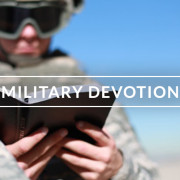The What and Why – August 12, 2022
Then Naomi took the child, laid him in her lap and cared for him. The women living there said, “Naomi has a son.” And they named him Obed. He was the father of Jesse, the father of David.
Ruth 4:16
Devotion based on Ruth 4:16
See series: Military Devotions
We usually are more concerned with the “What?” questions in life than with the “Why?”
We concentrate on what we are doing now and what we will do next. We look back at what we did in the past.
We usually don’t ask the “Why?” unless things seem to have gone wrong.
Then the question is often, “Why did this happen to me?”
We ask that when we try to make sense of some misfortune. We might blame ourselves for the trouble we are in or blame someone or something else.
We might even blame God.
Is he not ultimately responsible for what happens in our life? Is he not Lord of all?
An Old Testament woman named Naomi thought so.
She had lived in Bethlehem with her husband and two sons. Famine drove them to the heathen land of Moab. Her sons married Moabite women. Then both sons died—after her husband died.
She returned to Bethlehem with a daughter-in-law, Ruth. Both were widows now. Both were poor.
Upon her return, she told the people, “Don’t call me Naomi.”
“Naomi” means “pleasantness.” Her life was no longer pleasant.
“Call me Mara,” she said, “because the Almighty has made my life very bitter.”
“Mara” is the Hebrew word for bitter.
The “What?” question seems to have been answered for her. What she experienced was a bitter loss.
The “Why?” question awaited an answer. It must have been a painful wait.
Probably, no less painful for Ruth.
Ruth was now a widow in a foreign land. She was cut off from family and friends in Moab. What had happened to her did not seem good.
What was she doing there? She was accompanying her mother-in-law.
Why? The wife of Naomi’s other son stayed in Moab. Why would Ruth leave her family to live in Israel?
She had answered Naomi before they left. “Where you go I will go, and where you stay I will stay. Your people will be my people and your God my God” (Ruth 1:16).
The heathen Moabitess had learned that the God of Israel was the God who loved her, too.
Could this be why God led Naomi and her family to seek safety in Moab? Was this part of God’s plan to bring this heathen woman into the family of God?
It surely was.
What wondrous love the Lord has in his heart for people like Ruth!
But then, is it any less amazing that he reached out to us? Don’t each of us have an extraordinary story lying in our past even though we know only pieces of it?
How far back goes the thread of our rescue from death and hell? What has all taken place that we can now stand among the family of God?
Our story of salvation began in Eden with God’s promise of a Savior. It continues on to include what happened to Naomi and her daughter-in-law.
Ruth married a God-fearing man from Bethlehem. As a result, she gave Naomi a grandchild named Obed. We don’t know much about him or his son Jesse. But we do know a great deal about his grandson, David, the giant killer, David, the king.
A thousand years later, in that same Bethlehem, from the bloodline of Ruth, Jesus the Savior was born.
Without him, we would have no hope.
What happened to Naomi in Moab made her life bitter.
Why it happened makes our life blessed.
The psalmist wrote, “Blessed are the people whose God is the LORD” (Psalm 144:15).
The “What?” in the lives of God’s people is explained with the “Why?”
Why?
Because he loves us.
Prayer: Heavenly Lord Jesus, you once said, “I am the way, the truth, and the life.” The story of our salvation begins with your undeserved love. What you allow to happen in our lives flows from the wonderful reason why it happened: to make us your own. For that, we will praise you forever. Amen.
Points to ponder:
- How does the knowledge that people outside of the nation of Israel are in the Savior’s bloodline bring us assurance?
- Do you think Naomi’s faith was weak when she said God had made her life bitter?
- The book of Ruth does not mention the way of salvation. Why do you think it is in the Bible?
Written and recorded by Rev. Paul Horn, WELS National Civilian Chaplain to the Military, San Diego, California.
All Scripture quotations, unless otherwise indicated, are taken from the Holy Bible, New International Version®, NIV®. Copyright ©1973, 1978, 1984, 2011 by Biblica, Inc.™ Used by permission of Zondervan. All rights reserved worldwide. Note: Scripture reading footnotes are clickable only in the web version.


